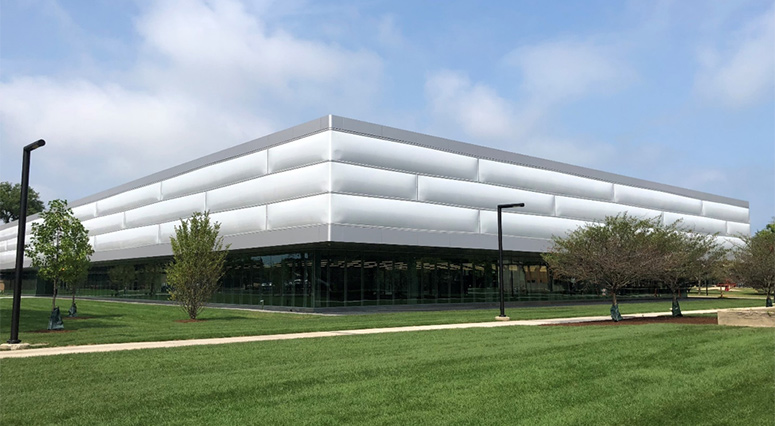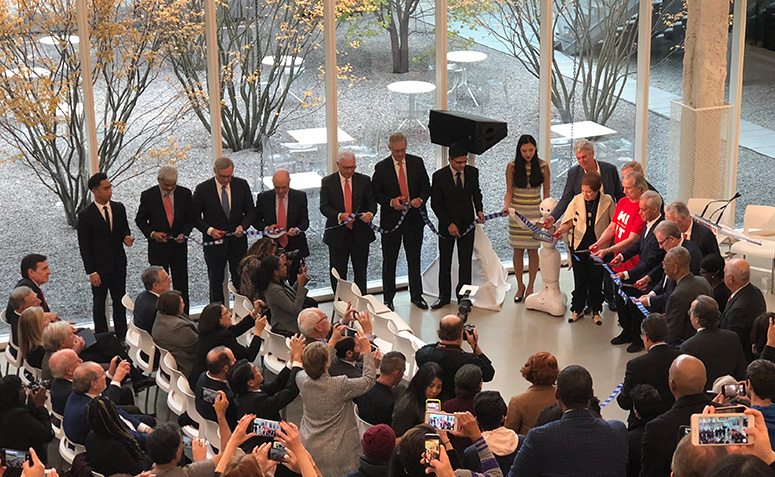Q&A WITH HOWARD TULLMAN
Executive Director of the Kaplan Institute for Innovation and Tech Entrepreneurship,
Illinois Institute of Technology
In this issue of Catalyst, we sit down with the Executive Director of the Kaplan Institute for Innovation and Tech Entrepreneurship at the Illinois Institute of Technology. We discuss goals for the new Institute, the role of universities in entrepreneurship, and the new tech district emerging from Chicago’s South Side.
The new Kaplan Institute at Illinois Tech had its grand opening last month. Tell us about the vision for the Institute and what attracted you to take on this new challenge.
At the Kaplan Institute, our primary objectives are (1) to create a new interactive and inter-disciplinary space where Illinois Tech students and faculty can initiate, develop and iterate their ideas for new businesses and civic/social solutions, (2) provide students instruction in the basics of innovation, entrepreneurship and human-centered design, and (3) to be a new front door for business and industry to better access the university’s resources in order to assist them in developing solutions for the kinds of next-generation problems which will increasingly cross domains, silos and specialties and require multi-school and/or multiple department solution teams.
I was particularly attracted to the Kaplan Institute by the fact that 30% or more of each year’s incoming freshman at Illinois Tech are highly-diverse and the first in their families to attend college. If we are going to solve the critical technical talent shortages and the associated diversity issues in the tech sector in Chicago and extend the economic and social benefits of new tech to the entire city, it will start by improving industry’s access to the kinds of students and graduates we are turning out at Illinois Tech.
What new opportunities does the space present for students and faculty? How will the Kaplan Institute enhance and grow Illinois Tech’s entrepreneurship initiatives?
The building is intended to encourage collaborations, interactions, lateral learning, collisions and inspiration by assuring that all of the occupants will be exposed to and learn from whatever is taking place inside. True innovation largely takes place at the edges of business and standard practices and in unexpected ways especially as new technologies and applications continue to jump quickly from industry to industry and across traditional boundaries.
The building will contain new equipment and tools in leading-edge tech areas like 3D maker spaces, AR/MR/VR labs and demo spaces, robotics, etc. as well as a large variety of alternative work spaces, presentation rooms and assembly areas. The wide-open building is designed to morph over time based on the changing demands of its occupants and users. This will assure that we are best able to adapt to everything coming down the pipeline including new teaching methods, new equipment and technology requirements, differing industry requirements, online delivery and learning systems, etc.
In the data we collect through our Illinois Innovation Index, we’ve seen significant growth in the number of startups created by students and faculty at Illinois universities, and the intentional efforts of many universities to create spaces and programming to nurture this activity. Why do you think more people across campus are choosing to pursue entrepreneurial activities?
We expect that a very large portion of the population (maybe over 50%) will be “self-employed” within the next ten years and all of these individuals will have figured out that they will need training in entrepreneurial skills (whether they ultimately begin and build their own businesses or not) as well as some basic experience using what we call “new” collar skill sets to solve problems, work in teams, and create new and disruptive solutions.
The majority of universities are responding (somewhat belatedly) to these changed needs to better prepare their graduates, but most of their efforts are somewhat cosmetic and not as committed and intentional as what we are doing with the Kaplan Institute. Cultures and long-standing systems don’t change because you talk about change; they change when you take concrete steps to commit to the necessary changes and to creating a new and better future for your students.

Kaplan Institute, Illinois Institute of Technology Campus
As someone who’s viewed entrepreneurship from multiple perspectives—as a startup founder, CEO of 1871, and as an educator—what do you view as the best approach to entrepreneurship education at the university-level?
I always say that you can’t teach someone to be an entrepreneur (it’s in their DNA or it’s not), but you can help someone who is inclined to be a far better and more successful entrepreneur by equipping them with a known set of skills, behaviors and tactics that have been developed and consistently used for many years by experienced business builders. The necessary concepts and strategies include simple storytelling and selling, iteration and continual improvement, pattern recognition and triage, focus and prioritization, and failing forward. The critical behaviors include hard work, thorough preparation, fierce perseverance, a measure of patience and a set of clear values.
We also believe that you want seasoned educators who have both been there and built businesses, and have synthesized their experiences into transferable lessons and tactics rather than one-off war stories. If you can’t tell whether someone was smart or just lucky in their success, they most likely don’t have much of value to share with our students. Finally, we think that hands-on, practical experience is essential, but it needs to be highly-structured, and grounded in the realities of what it takes today to start and scale a successful new enterprise.
In a recent report, we highlighted the importance of collaborations between industry and academia and the growth of business-funded academic research in Illinois over the last 5 years. How are you thinking about corporate engagement more broadly at Illinois Tech and what are some of the ways the corporate community can plug into the Kaplan Institute?
Although there have been some advances in business-funded academic research, the aggregate expenditures still remain woefully short of the potential in part because it hasn’t been easy for interested industry leaders to determine how best to interact with the universities and how to successfully navigate the silos, turf and funding issues and other barriers that have existed in the past so that they can more easily and cost-effectively access the talents and resources there.
You’ve written about the Kaplan Institute as one part of a new tech district emerging on the city’s South Side, which includes resources at the University of Chicago, University of Illinois at Chicago, and the proposed Discovery Partners Institute led by the University of Illinois. What will this growing tech district mean to Chicago’s status as a tech hub?
The explosion and rapid job and company growth in the River North area (surrounding the 1871 hub at the Mart) as a center for tech startups and then the West Fulton dramatic expansion (anchored by Google) are both great starts, but they’re already suffering from space and support limitations whereas the area immediately south of the Loop is virtually a greenfield opportunity and an area just beginning the kind of renaissance and redevelopment that is a central part of Chicago’s DNA.
We expect that the Farpoint redevelopment of the Michael Reese property along with the other initiatives you mention will quickly remake large and readily accessible parts of the South Side into the next tech hub just as we’ve seen similar non-central expansions in other geographic areas like South San Francisco, Brooklyn, etc.
As one of Chicago’s tech leaders, how do you view the city’s progress as a tech hub in recent years? In what areas does the city still need to make progress to further grow its tech ecosystem?
As I said above, we need to educate and attract and recruit and retain great and diverse tech talent in the city. We already have great schools, many important corporate headquarters, and ample venture funding. We also need a new Mayor who is tech- and business-focused.

